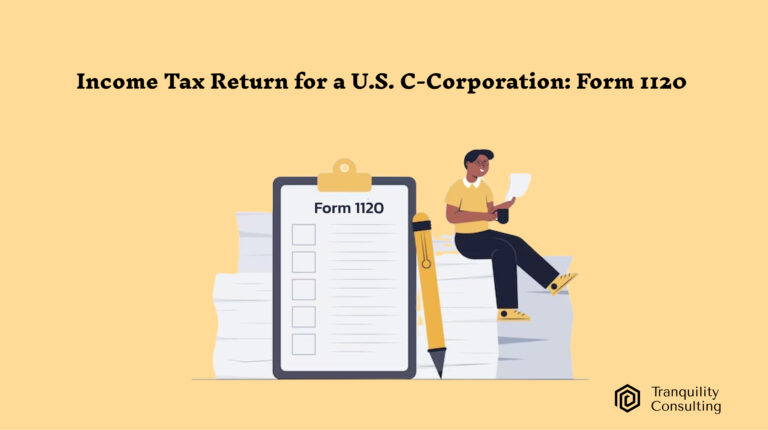Running a C-corporation in the United States involves many tax obligations, including filing an income tax return using Form 1120. This form is essential for reporting the corporation’s income, gains, losses, deductions, and credits. Understanding the importance of Form 1120, what it entails, and the filing process will help businesses comply with the Internal Revenue Service (IRS).
What is Form 1120?
Form 1120, or the U.S. Corporation Income Tax Return, is a form C-corporations must file annually with the IRS to report their income and taxes. Unlike other business structures, such as S-corporations or Limited Liability Companies (LLCs), a C-corporation is a separate legal entity and must pay corporate taxes directly to the IRS.
Form 1120 is used for the following purposes:
- Reporting the corporation’s income.
- Reporting any capital gains or losses.
- Declaring deductions and credits that the company is eligible for.
- Calculating the overall tax liability of the corporation.
Who Needs to File Form 1120?
Every C-Corporation operating in the U.S. must file Form 1120, regardless of whether the business made a profit or loss during the tax year. Additionally, if a foreign corporation is doing business within the United States, it may also be required to file Form 1120. Even non-profit organizations with unrelated business taxable income (UBTI) may need to file Form 1120 to report those earnings. This ensures transparency and compliance with U.S. tax laws.
Important Sections of Form 1120
Form 1120 includes several sections that capture the corporation’s financial activities over the tax year:
- Income Section: This section reports all the gross income the corporation earned, including sales, interest, dividends, rents, and any other revenue streams.
- Deductions: This is where the corporation can deduct business expenses such as salaries, wages, rent, interest, depreciation, and advertising costs.
- Tax and Payments: In this section, corporations calculate their taxable income and determine the total tax liability owed. Corporations can apply any previously paid estimated taxes or any credits from other filings.
- Signatures: The form must be signed by a corporate officer or representative. A paid preparer may also sign the form if they helped complete it.
Deadlines for Filing Form 1120
The deadline for filing Form 1120 is typically the 15th day of the fourth month following the end of the corporation’s tax year. For most corporations using the calendar year, this date is April 15. If a corporation requires more time to file, it can request an extension using Form 7004. This gives the business an extra six months to submit Form 1120, but any taxes owed must still be paid by the original deadline.
Penalties for Failing to File Form 1120
The IRS penalizes corporations that fail to file Form 1120 by the deadline. The penalty is usually 5% of the unpaid tax for each month the return is late, up to a maximum of 25%. If the corporation does not owe taxes but still fails to file, the IRS may impose a minimum penalty of $435 or 100% of the unpaid tax, whichever is smaller. Late payment penalties and interest can also apply if the corporation does not pay its tax liability on time.
Tax Deductions and Credits for C-Corporations
One of the benefits of filing Form 1120 is that C-Corporations can take advantage of various tax deductions and credits, which can reduce their overall tax liability. Here are some standard deductions available to C-Corporations:
- Salaries and Wages: Corporations can deduct the cost of paying their employees’ salaries, wages, and benefits such as health insurance.
- Depreciation: The cost of business assets like machinery, buildings, and vehicles can be deducted over time as they depreciate.
- Advertising and Marketing: Costs related to advertising the business, including digital marketing campaigns and traditional ads, are fully deductible.
- Interest on Loans: The interest paid is deductible if the corporation has taken out loans for business purposes.
In addition to deductions, C-Corporations may be eligible for several tax credits, including energy efficiency credits, research and development credits, and work opportunity credits. These credits directly reduce the corporation’s tax liability.
Tax Rate for C-Corporations
As of 2024, the tax rate for C-corporations in the U.S. is a flat 21% on their taxable income. This rate was reduced from previous levels after implementing the Tax Cuts and Jobs Act (TCJA) in 2017. While this rate applies to federal taxes, C-corporations may also be subject to state corporate income taxes, which vary by state.
Filing Form 1120 with Estimated Tax Payments
Many C-corporations must make estimated tax payments throughout the year, especially if they expect to owe more than $500 in taxes. These payments help the corporation avoid penalties for underpayment of taxes. Form 1120-W calculates estimated taxes, and corporations make these payments quarterly. Failure to make estimated tax payments can result in fines, even if the corporation pays the total amount owed when it files Form 1120. Tracking estimated payments and reconciling them on Form 1120 helps ensure accurate reporting.
Conclusion
Filing the income tax return for a U.S. C-corporation using Form 1120 is critical to staying compliant with tax laws. Whether your corporation is large or small, understanding the intricacies of Form 1120 can help reduce tax liability, avoid penalties, and keep the business running smoothly. Taking advantage of tax deductions and credits, meeting deadlines, and ensuring accurate filing will help your corporation stay in the IRS’s good graces while optimizing its financial position.
FAQs
- What is Form 1120?
Form 1120 is the U.S. Corporation Income Tax Return, which C-Corporations must file annually to report income and calculate taxes owed.
- When is Form 1120 due?
For calendar-year corporations, the due date for filing Form 1120 is April 15. Extensions can be requested using Form 7004.
- Can I file Form 1120 electronically?
Yes, C-Corporations can file Form 1120 electronically through the IRS e-file system, which is faster and provides instant confirmation.
- What deductions can a C-Corporation claim on Form 1120?
C-Corporations can deduct salaries, advertising, depreciation, and interest on loans, among other business expenses.
- What penalties apply if I file Form 1120 late?
Failing to file Form 1120 on time can result in penalties, including 5% of the unpaid tax for each month the return is late, up to 25%.
If you have any questions or need business-related tax consulting advice, please contact us at: [email protected]





